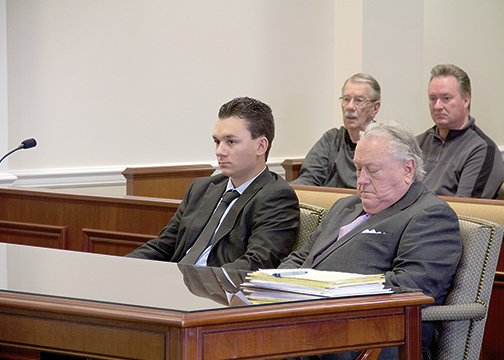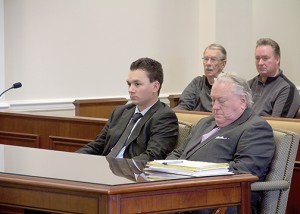

Editor
The former Bethel police officer charged with rape was found not guilty during his trial on Nov. 23 and 24.
Judge Victor Haddad found Brandon Brenes, 25 years old, of Batavia, not guilty because there was not enough evidence to convict him beyond a reasonable doubt of the 25-year-old alleged victim’s claims that Brenes sexually abused her on Dec. 27, 2014.
The court’s job is not to get involved in the generalizations and some of the statements by the attorneys because there is not evidence to support some claims, Haddad said.
In addition, there was no expert testimony provided so that the victim’s claims of impairment could be better supported. However, testimony on substantial impairment can be provided by witnesses, Haddad said.
“This is where I’m going to be a little blunt. As to Mr. Brenes, the court finds that some of your testimony is less than forthcoming and in some instances I find it bordered on arrogant,” Haddad said.
He added, “However, as to (the victim), there were also inconsistencies in her testimony as well…(the victim’s) testimony as to her level of impairment is clearly inconsistent with the results of the toxicology report.”
Haddad also pointed out that the victim testified that she drank no more this night than any other typical night and she has no history of blackouts or memory loss.
The two stories are very different, but it is clear that both parties were impaired and that there was regrettable consequences to their actions, Haddad said.
The victim initiated contact with Brenes that night, defense attorney R. Scott Croswell said. She was upset because of relationship issues she was having.
On Dec. 27, 2014, there was sexual contact between the victim and Brenes. The two were best friends and Brenes had reason to believe the victim’s judgement was impaired, assistant prosecutor Catherine Adams said.
There is no way to know for a fact what the victim drank at the bar, but the victim said she had four to five drinks throughout the night and said that was about normal for her, Adams said.
When the victim woke up at home Brenes was performing a sex act on her and her hand was on his genitalia. The victim did not know how her hand got there and would have no interest in Brenes anyway because she is a lesbian, Adams said.
“He violated the most basic thing he knows about her: that he is her friend and that she doesn’t have sex with men,” Adams said.
The fact that the victim is a lesbian does not make the case. Lesbians can have sex with men, Croswell said.
However, Brenes said that the victim did not go to sleep, but gave clear indications she was open to being intimate with Brenes and that she put her own hand on Brenes genitalia while he performed a sex act on her, Croswell said.
Brenes said that the two were interrupted when the victim’s dogs jumped on the bed and that she took them outside. When she came back she asked Brenes to leave so he did. Croswell believes she had second thoughts when she let her dogs out.
“The only story that makes sense is his story,” Croswell said.
There is no evidence the victim lied to police, Adams said, but there is evidence that Brenes did. Adams felt that Brenes should at least be charged with sexual battery, if not rape.
Croswell feels the victim is only remembering what is convenient for her to remember about the night to help her case.
Adams told Judge Haddad that Brenes has shown himself to be a liar. Brenes admitted he did perform a sex act with the victim that night, which he lied to the police officers about when they questioned him, Adams said.
“Obviously he was lying,” Adams said.
She also pointed out that Brenes has stated the two were both intoxicated, and who would know better than Brenes that the victim was drunk since he and the victim drank together often. In addition, Brenes was trained as a police officer so he should be able to recognize drunkenness, Adams said.
“His relationship with her at that point put him in the position to know that (she was drunk),” Adams said.
She also cited text messages between the victim and Brenes, specifically one when Brenes said ‘Don’t hate me’ to the victim and said he was out of control. It is obvious in Brenes’s text messages that he is apologizing, Adams said.
The victim claims she was out of it and that she felt funny after the first drink, but Croswell questioned why, if she was feeling off, did she not tell Brenes, her best friend, about it.
The victim said she told someone else about how she was feeling, so if she really did tell someone, Croswell asked, why wasn’t that person wasn’t in court to corroborate her story.
He also asked why the five or six people the victim interacted with besides Brenes that night or the person she called and talked to for 28 minutes after Brenes left her place after the incident were not in court to testify.
“The only reason it’s not presented is it doesn’t exist,” Croswell said.
He added that the state has an obligation to bring all evidence forward. The state has not erased reasonable doubt, Croswell said.
During the trial, the prosecution called the victim and the defense called the defendant and one witness.
Even though the victim said she was unable to consent, that does not mean she actually was. There is a major difference between drinking and being impaired, Croswell said.
“But for this girl’s word you have not one piece of evidence,” Croswell said.
He also referenced video footage of the victim at the bar and on the street after she leaves the bar. In all the footage, that does not include audio, the victim is not so impaired as she claims. She is walking well and maneuvers heavy crowds at the bar with no issue, Croswell said.
The victim said when she left the bar she couldn’t walk without Brenes’s help but video footage shows her walking alone. Brenes stated that the victim did not need help, Croswell said.
Adams feels it is a big leap to say that if she isn’t falling down that she isn’t impaired. Everyone reacts differently to alcohol.
In addition, the victim gave directions to her house, brushed her teeth, changed and let her dogs out, all things Croswell believes she would not have done if she was as impaired as she said.
The evidence that the victim was impaired is in Brenes’s statement that both he and the victim were drunk.
The victim has no reason to put herself through this trial if she did consent, Adams said.
Adams believes Brenes knew he would be in trouble if he admitted that the victim did not consent but on the first day of the two-day trial was smart enough not to lie about the sex act that occurred. She also said Brenes changed his position on whether or not the victim was impaired.
This is the first time in Croswell’s career that a defendant has made a statement that made his case worse voluntarily, he said in reference to Brenes admitting recently the specifics of what occurred. Croswell said that maybe in retrospect Brenes realized that he did what officers asked him about but at the time did not realize his actions counted as such.
In addition, medical records corroborate that Brenes performed a sex act on the victim, Adams said.
A toxicology report shows that at 3:51 p.m. on Dec. 28, the victim has no alcohol or drugs in her system, Adams said, although Croswell disputed the time of the report, which he believes was taken around 2 p.m.
Brenes was working as a police officer in the village of Bethel at the time of the incident. He was put on paid administrative leave on Dec. 30, 2014, and would have been put on unpaid administrative leave after the indictment. However, Brenes resigned April 30, said Bethel Administrator Travis Dotson in May.
